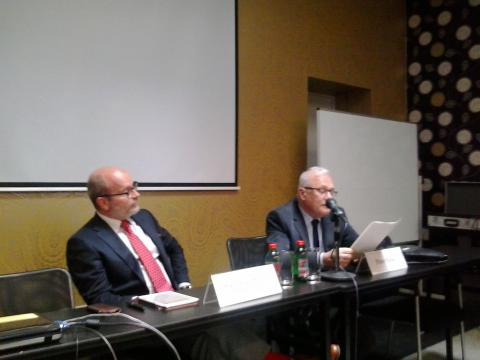Event Report - “Slovak Foreign Policy after EU and NATO Accession: National and International Challenges”

CEU’s Center for EU Enlargement Studies (CENS), the Embassy of the Slovak Republic in Hungary, and the CEU Rectorate hosted third Ambassadorial Lecture Series event of 2014 on 23 April 2014 entitled “Slovak Foreign Policy after EU and NATO Accession: National and International Challenges”. The lecture was delivered by Ambassador of the Slovak Republic to Hungary, H.E. Mr. Rastislav Káčer, to a distinguished group of diplomats, ambassadors, students and university professors. The lecture was chaired by Péter Balázs, Director of CENS and former Hungarian Minister of Foreign Affairs.
The European Union and NATO are very important for Slovakia, said Ambassador Káčer at the beginning of his presentation. It is crucial for a middle-sized country like Slovakia to be part of a decision making process. Ambassador Káčer explained there are also many challenges in these two structures. At first sight, the EU and NATO have many overlaps, but in reality they are two different species. The EU is mainly a soft power tool, whereas NATO is a hard power tool, and the real challenge is to combine both the soft and hard power tools. He emphasized that NATO’s abilities have been shrinking in recent years and after 60 years NATO is not as fit as it was in the past. NATO’s ability is very bad (including Slovakia, Hungary and the rest of the V4 countries). EU’s soft power is strong, he said, but recently it has been melting down, too. Euroscepticism and eurosceptics are also one of the challenges. “I am an optimist” he said, as Slovakia is performing better in many areas (GDP, credits, investments from the EU, export to the EU, etc.) than it did before it joined the EU. He concluded by saying that we are facing very challenging times at the moment, beyond the EU and NATO, and the world is going through a series of dynamic changes that no human history has ever experienced before. Ultimately, Slovakia's ten years within the EU and NATO is a great success story and the small differences between the two should not spoil the harmony that exists.
The lecture was followed by a lively question and answer session, touching upon a variety of issues: the current situation in Ukraine, Slovakia’s position and the future of the V4 group and many others.
